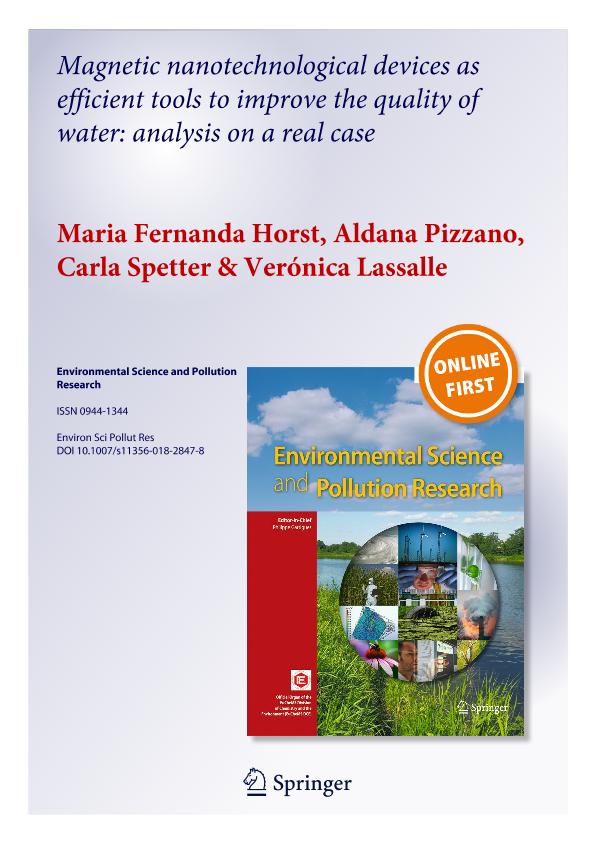Mostrar el registro sencillo del ítem
dc.contributor.author
Horst, María Fernanda

dc.contributor.author
Pizzano, Aldana
dc.contributor.author
Spetter, Carla Vanesa

dc.contributor.author
Lassalle, Verónica Leticia

dc.date.available
2019-11-25T15:33:05Z
dc.date.issued
2018-08-02
dc.identifier.citation
Horst, María Fernanda; Pizzano, Aldana; Spetter, Carla Vanesa; Lassalle, Verónica Leticia; Magnetic nanotechnological devices as efficient tools to improve the quality of water: analysis on a real case; Springer Heidelberg; Environmental Science and Pollution Research; 25; 28; 2-8-2018; 28185-28194
dc.identifier.issn
0944-1344
dc.identifier.uri
http://hdl.handle.net/11336/89663
dc.description.abstract
Magnetic nanoparticles (MNPs), based on iron oxide (magnetite) and ferrogel of gelatin and MNPs, were employed as efficient tools for the removal of heavy metals and nutrients from water samples from Bahia Blanca estuarine (BBE). An exhaustive adsorption performance of Cu, NO3 −, and NO2 − was conducted in batch using model solutions aiming to adjust the adsorption conditions. Adsorption studies using water simulating the real samples were also performed. Both kinds of nanomaterials demonstrated an efficiency between 60 and 80%, and 85% for the removal of heavy metals and NO3 − and NO2 −, respectively. Similar adsorption assays were performed using BBE water samples, employing the experimental conditions explored with model and simulated water. The reached efficiency was 30 and 45% for heavy metal and nutrient removal, respectively, using nanoparticles; meanwhile, ferrogels displayed a removal capacity around 50?60%. The nanoparticles showed structural instability by the leaching of iron to the medium after the adsorption processes. Ferrogels remained almost inalterable in terms of their integrity during the adsorption time. These materials showed satisfactory perspectives regarding their reuse possibilities. They were used for almost five repeated cycles of adsorption without losing efficiency on the adsorption. The results of this study suggest that MNPs and FGs appear as versatile and promising materials that may be considered as valid alternatives to the actual tools for the remediation of real water samples.
dc.format
application/pdf
dc.language.iso
eng
dc.publisher
Springer Heidelberg

dc.rights
info:eu-repo/semantics/openAccess
dc.rights.uri
https://creativecommons.org/licenses/by-nc-sa/2.5/ar/
dc.subject
ADSORBENT NANOMATERIALS
dc.subject
ESTUARINE WATER REMEDIATION
dc.subject
FERROGELS
dc.subject
HEAVY METALS
dc.subject
MAGNETIC NANOPARTICLES
dc.subject
NUTRIENTS
dc.subject.classification
Nano-procesamiento

dc.subject.classification
Nanotecnología

dc.subject.classification
INGENIERÍAS Y TECNOLOGÍAS

dc.title
Magnetic nanotechnological devices as efficient tools to improve the quality of water: analysis on a real case
dc.type
info:eu-repo/semantics/article
dc.type
info:ar-repo/semantics/artículo
dc.type
info:eu-repo/semantics/publishedVersion
dc.date.updated
2019-09-10T20:23:14Z
dc.journal.volume
25
dc.journal.number
28
dc.journal.pagination
28185-28194
dc.journal.pais
Alemania

dc.journal.ciudad
Heidelberg
dc.description.fil
Fil: Horst, María Fernanda. Consejo Nacional de Investigaciones Científicas y Técnicas. Centro Científico Tecnológico Conicet - Bahía Blanca. Instituto de Química del Sur. Universidad Nacional del Sur. Departamento de Química. Instituto de Química del Sur; Argentina
dc.description.fil
Fil: Pizzano, Aldana. Consejo Nacional de Investigaciones Científicas y Técnicas. Centro Científico Tecnológico Conicet - Bahía Blanca. Instituto de Química del Sur. Universidad Nacional del Sur. Departamento de Química. Instituto de Química del Sur; Argentina
dc.description.fil
Fil: Spetter, Carla Vanesa. Consejo Nacional de Investigaciones Científicas y Técnicas. Centro Científico Tecnológico Conicet - Bahía Blanca. Instituto Argentino de Oceanografía. Universidad Nacional del Sur. Instituto Argentino de Oceanografía; Argentina. Universidad Nacional del Sur. Departamento de Química; Argentina
dc.description.fil
Fil: Lassalle, Verónica Leticia. Consejo Nacional de Investigaciones Científicas y Técnicas. Centro Científico Tecnológico Conicet - Bahía Blanca. Instituto de Química del Sur. Universidad Nacional del Sur. Departamento de Química. Instituto de Química del Sur; Argentina
dc.journal.title
Environmental Science and Pollution Research

dc.relation.alternativeid
info:eu-repo/semantics/altIdentifier/url/http://link.springer.com/10.1007/s11356-018-2847-8
dc.relation.alternativeid
info:eu-repo/semantics/altIdentifier/doi/https://doi.org/10.1007/s11356-018-2847-8
Archivos asociados
